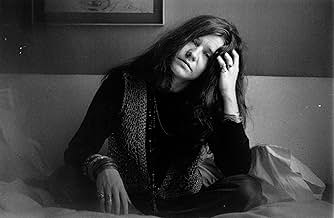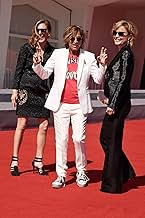IMDb रेटिंग
7.4/10
5.7 हज़ार
आपकी रेटिंग
अपनी भाषा में प्लॉट जोड़ेंMusician Cat Power narrates this documentary on Janis Joplin's evolution into a star from letters that Joplin wrote over the years to her friends, family, and collaborators.Musician Cat Power narrates this documentary on Janis Joplin's evolution into a star from letters that Joplin wrote over the years to her friends, family, and collaborators.Musician Cat Power narrates this documentary on Janis Joplin's evolution into a star from letters that Joplin wrote over the years to her friends, family, and collaborators.
- पुरस्कार
- 2 जीत और कुल 2 नामांकन
Cat Power
- Janis Joplin
- (वॉइस)
- (as Chan Marshall)
Janis Joplin
- Self
- (आर्काइव फ़ूटेज)
Otis Redding
- Self
- (आर्काइव फ़ूटेज)
फ़ीचर्ड समीक्षाएं
I will say up front that I am a fan of Janis Joplin and looked forward to seeing this (on the BBC) it details her life in chronological order from her days growing up in Port Arthur, Texas to her many incarnations with all of her bands including 'Big Brother and the Holding Company'.
There are interviews with friends, lovers and family. There is plenty of archive footage but only snippets of songs which includes the Monterey Pop appearance. Many songs are featured but the real reason here is to tell her story and her battles with drugs and alcohol and her of love of the blues, which she could sing so beautifully that even watching this I felt the hairs on the back of my neck rising.
It is amazing how she managed to put so much emotion and passion into her music and it seems the people around it saw that in her too. Her firmament burnt for too short a time but while it did so it was also one of the brightest and most loved. I truly think this is a great tribute to Janis Joplin – not just the star but the person – highly recommended.
There are interviews with friends, lovers and family. There is plenty of archive footage but only snippets of songs which includes the Monterey Pop appearance. Many songs are featured but the real reason here is to tell her story and her battles with drugs and alcohol and her of love of the blues, which she could sing so beautifully that even watching this I felt the hairs on the back of my neck rising.
It is amazing how she managed to put so much emotion and passion into her music and it seems the people around it saw that in her too. Her firmament burnt for too short a time but while it did so it was also one of the brightest and most loved. I truly think this is a great tribute to Janis Joplin – not just the star but the person – highly recommended.
Viewed at 2015 Venice Film Festival., "Janis, Little Girl Blue" by Amy Berg, With Alex Gibney, himself an outstanding documentarian acting as producer, is a Great Doc about a great American singer, Janis Joplin, who died too young on the verge of salvation.
Interviews with parents, sister, brother, surviving members of The Grateful Dead, Kris Kristofferson, and most surprising, Dick Cavett (1970). In a year of many good documentaries, this was the best of all -- a marvelous reconstruction of a tragic young life. Janis sang the blues with such conviction and such black feeling that even afro-Americans though she was black -- She died on October 4, 1970 in a Hollywood motel of an accidental heroin overdose at age 27 -- only two weeks after another rock legend, Jimi Hendrix, also at age 27. The film traces her life from humble origins in the nondescript north Texas town of Port Arthur, constant humiliation by her schoolmates because of her extreme nonconformity and relatively plain looks, up through her rise to prominence as the lead singer of the acid/rock band Big Brother and the Holding Company --one of the leading San Francisco rock groups of the mid sixties -- reaching the pinnacle when recognized as the top white blues singer of the age, her difficulties dealing with fame, her loneliness in the midst of adoring crowds, her battle with drug addiction, and finally her tragic early death on the verge of even wider fame and general acceptance by the serious music world.
Needless to say, the film is liberally spiced with clips from her amazing stage appearances, which is an added enrichment, but this is far from a mere excuse to present her songs -- far more a penetrating probe into the life of an extremely complex personality ---a true artist who became the victim of her own profound talent. Myself more or less a product of the psychedelic sixties, I left the vast Venice theater thoroughly emotionally drained and realizing I had just witnessed a remarkable film about a most remarkable life. Alex, Budapest
Interviews with parents, sister, brother, surviving members of The Grateful Dead, Kris Kristofferson, and most surprising, Dick Cavett (1970). In a year of many good documentaries, this was the best of all -- a marvelous reconstruction of a tragic young life. Janis sang the blues with such conviction and such black feeling that even afro-Americans though she was black -- She died on October 4, 1970 in a Hollywood motel of an accidental heroin overdose at age 27 -- only two weeks after another rock legend, Jimi Hendrix, also at age 27. The film traces her life from humble origins in the nondescript north Texas town of Port Arthur, constant humiliation by her schoolmates because of her extreme nonconformity and relatively plain looks, up through her rise to prominence as the lead singer of the acid/rock band Big Brother and the Holding Company --one of the leading San Francisco rock groups of the mid sixties -- reaching the pinnacle when recognized as the top white blues singer of the age, her difficulties dealing with fame, her loneliness in the midst of adoring crowds, her battle with drug addiction, and finally her tragic early death on the verge of even wider fame and general acceptance by the serious music world.
Needless to say, the film is liberally spiced with clips from her amazing stage appearances, which is an added enrichment, but this is far from a mere excuse to present her songs -- far more a penetrating probe into the life of an extremely complex personality ---a true artist who became the victim of her own profound talent. Myself more or less a product of the psychedelic sixties, I left the vast Venice theater thoroughly emotionally drained and realizing I had just witnessed a remarkable film about a most remarkable life. Alex, Budapest
Of course I know who Janis Joplin was, who doesn't, but I was never a huge fan of her work, so I did not know anything about her life story.
And what a great story it was, told by those who knew Janis the most, the Documentary was loaded with interviews from the people closet to her who were there for the ride that was her life. Mixed in with a lot of archive footage of Joplin as well as a touching voice over of letters Joplin wrote to her family back home being read during the film.
But most importantly, lots of music was played. I've seen docs and other movies about major rock icons where the music was not center stage simple because of legal rights. Does not feel like Little Girl Blue had that problem, and I'm thankful, cause as much as her life was interesting, it's all about the music.
It was funny, entertaining, and centered on the rock and roll as they told the story of one of the greatest icons in music history.
And what a great story it was, told by those who knew Janis the most, the Documentary was loaded with interviews from the people closet to her who were there for the ride that was her life. Mixed in with a lot of archive footage of Joplin as well as a touching voice over of letters Joplin wrote to her family back home being read during the film.
But most importantly, lots of music was played. I've seen docs and other movies about major rock icons where the music was not center stage simple because of legal rights. Does not feel like Little Girl Blue had that problem, and I'm thankful, cause as much as her life was interesting, it's all about the music.
It was funny, entertaining, and centered on the rock and roll as they told the story of one of the greatest icons in music history.
Amy Berg's documentary charting the course that blues and rock singer Janis Joplin took from her childhood hometown of Port Arthur, Texas to San Francisco and then Los Angeles in the 1960s is filled with great clips and fantastic music (particularly the performance of the lesser-known "Little Girl Blue" shown at the conclusion). However, there's nothing here--not even the reading of letters Janis wrote home to her family--that will surprise anyone who has followed Joplin's career since her untimely demise in October 1970. Although she lived a wild, scattered but full-blooded life in her 27 years, Joplin's recording career was extremely brief (two albums, one with her first band, Big Brother and the Holding Company, followed by a solo album, released posthumously). Janis as a human being was anything but predictable, and yet the myriad of documentaries chronicling her life and stardom all seem to cover the same territory, the sex-drugs-and-rock and roll high-life. Berg insulates Joplin here, as Joplin was insulated by the yes-men in her life who were trying to steer her career. We do not hear about the books Janis read (she was a huge F. Scott Fitzgerald fan), the movies she saw, how she felt about the war in Vietnam or the hippie movement or her second-rate (for her) performance at Woodstock. She is, of course, a tragic figure in popular music, but fleshing out that figure--giving us some surprising, intimate insights into her quirky personality--has yet to be achieved. **1/2 from ****
The recent documentary Amy, depicting singer Amy Winehouse's rise and fall at about the same age as Janis Joplin reminds me that all rockers are not the same, especially females. Janis: Little Girl Blue depicts Joplin as much more focused than Amy and much more in control of her own life. Except for in death, where both succumb to substance abuse, even the relatively more stable Amy.
This Janis doc does an effective job showing the arc of her brief life, from a country girl in Texas to the rocker who led the way for women in the industry and eventually the world. Why the eventual failure given her great fame and fortune? It's simple, really: She wanted to be loved, and not always finding that devotion, she could turn to music and drugs for support and fulfillment.
Along the way, the doc gives insight into what makes this blues mama run: In her own words she says ambition is the desire to be loved. She's not a "Cry Baby" about not getting the love she wanted from some of her friends and family; actually family members talk to us and appear to have supported her through it all.
Her straight-laced parents couldn't be expected to wholly embrace the counter-culture queen, who began innocently singing folk tunes in her early teens and ended singing blues that reminded one critic of "desperate mating calls." Professionally she gets plenty of love from the likes of Khris Kristofferson, whose Me & Bobby Magee was her best-selling single ever and band mate David Goetz, who observed that she turned into a caricature of the blues mama that the media had helped to create. Dick Cavett interviews her with an unusual affection different from his usually detached persona. At one point he can't remember if they were intimate—a nice touch of amnesia that doesn't belie a bit his attachment to her.
Janis: Little Girl Blue informs about Joplin's career from folk to hard blues, gives insight into the driving emotions of her ambition, and amply shows her singing talents that made her a child of Aretha Franklin and her own person.
A greatly satisfying bio of a great singer.
This Janis doc does an effective job showing the arc of her brief life, from a country girl in Texas to the rocker who led the way for women in the industry and eventually the world. Why the eventual failure given her great fame and fortune? It's simple, really: She wanted to be loved, and not always finding that devotion, she could turn to music and drugs for support and fulfillment.
Along the way, the doc gives insight into what makes this blues mama run: In her own words she says ambition is the desire to be loved. She's not a "Cry Baby" about not getting the love she wanted from some of her friends and family; actually family members talk to us and appear to have supported her through it all.
Her straight-laced parents couldn't be expected to wholly embrace the counter-culture queen, who began innocently singing folk tunes in her early teens and ended singing blues that reminded one critic of "desperate mating calls." Professionally she gets plenty of love from the likes of Khris Kristofferson, whose Me & Bobby Magee was her best-selling single ever and band mate David Goetz, who observed that she turned into a caricature of the blues mama that the media had helped to create. Dick Cavett interviews her with an unusual affection different from his usually detached persona. At one point he can't remember if they were intimate—a nice touch of amnesia that doesn't belie a bit his attachment to her.
Janis: Little Girl Blue informs about Joplin's career from folk to hard blues, gives insight into the driving emotions of her ambition, and amply shows her singing talents that made her a child of Aretha Franklin and her own person.
A greatly satisfying bio of a great singer.
क्या आपको पता है
- कनेक्शनFeatures Monterey Pop (1968)
टॉप पसंद
रेटिंग देने के लिए साइन-इन करें और वैयक्तिकृत सुझावों के लिए वॉचलिस्ट करें
- How long is Janis: Little Girl Blue?Alexa द्वारा संचालित
विवरण
- रिलीज़ की तारीख़
- कंट्री ऑफ़ ओरिजिन
- आधिकारिक साइट
- भाषा
- इस रूप में भी जाना जाता है
- Janis
- फ़िल्माने की जगहें
- उत्पादन कंपनियां
- IMDbPro पर और कंपनी क्रेडिट देखें
बॉक्स ऑफ़िस
- US और कनाडा में सकल
- $4,10,465
- US और कनाडा में पहले सप्ताह में कुल कमाई
- $21,861
- 29 नव॰ 2015
- दुनिया भर में सकल
- $16,83,166
- चलने की अवधि1 घंटा 43 मिनट
- रंग
- पक्ष अनुपात
- 1.78 : 1
इस पेज में योगदान दें
किसी बदलाव का सुझाव दें या अनुपलब्ध कॉन्टेंट जोड़ें




































